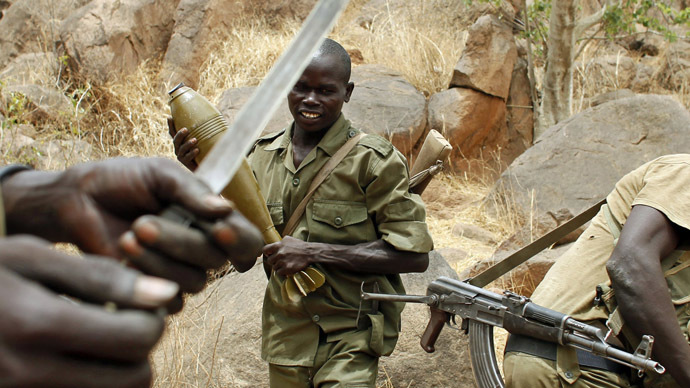US and UK pursuing a ‘massive land grab’ in South Sudan

Salva Kiir government in South Sudan is effectively “a terrorist government put in power by the West” to tap into country’s vast resources, war correspondent Keith Harmon Snow, told RT.
RT:How possible is another irrevocable split - this time of South Sudan? Or has that already happened in reality?
Keith Harmon Snow: It is already happening in reality. The fighting since December 15 has led to the murder of about 5,000 people in the Juba area according to reports we are getting from South Sudan. Of course, none of this is in the international media at all; the international press is completely relying on the government of Salva Kiir for their facts and their information. And the government of Salva Kiir is effectively a terrorist government put in power by the West.
RT:What interests are the US and UK pursuing in South Sudan? Why they are involved there?
KS: Massive land grab! We are talking about agricultural resources that have not been tapped into that [huge] agribusiness want to take control of it. Sudan is home to massive properties that are producing, or have produced in the past, the main ingredient for soft drinks and ice cream, which is gum-arabic. The Darfur area in particular was [important] because the gum-arabic produced there [accounts for two-thirds] of the world’s supply, and it's the best gum-arabic in the world. South Sudan has mining reserves and it also has massive oil reserves. Those are the biggest interests: land, oil, mining and agricultural production.
RT:How is the conflict affecting the oil industry and what is the international community doing about it?
KS: The oil industry in Sudan has backed the terrorism that happened there and agents of power that have put in place the government of Salva Kiir. The agents that supported the South Sudan, Sudan People’s Liberation Army (SPLA), would be the government of Uganda and powerful factions from the United States, including cooperative executives from the oil companies.
The interests of the oil companies have been served by bringing the SPLA into power, which they did, and they succeeded in creating a separate independent state called South Sudan. In the process, the oil has continued to flow out of South Sudan. They have brought about this situation and every day there is killing inside South Sudan; it benefits the oil companies because if you remove the people you have greater control of the land.

RT:How strong are the government's forces now?
KS: The Sudan People’s Liberation Army, which would be the government forces, has been split into several factions, and in the fight that has occurred recently has been the faction that is the government in power: Salva Kiir, versus Riek Machar. Both of these guys, Riek Machar and Salva Kiir, were from the Sudan People’s Liberation Army previously.
[The] government [of] Salva Kiir has perpetrated massive atrocities against the Luo-Nuer since December 15, especially the Nuer people in the Juba area, where the reports are 5,000 killed; and that would be mostly women and children, non-combatants of any sort. I don't see any possibility of what we would call democracy in South Sudan.
RT:Tens of thousands of civilians have found shelter in UN compounds. How vulnerable are they at this point?
KS: You have to look at the UN occupation of South Sudan as a part of a complete occupation, domination and expropriation of the land of Sudan from the people of Sudan. The UN interests in Sudan serve the power structures, they don’t serve the people.
The fact that they have created a refugee camp is just another business opportunity for organizations like Save the children, or the Norwegian People’s Aid, which has [projected] itself as a humanitarian organization, and has actually shipped weapons into South Sudan. You have to look at this from this prospective: the UN, the African Union, the Ugandan troops, and there are 3,000 Ugandan troops currently in South Sudan backed by the Pentagon, backed by the African command of the Pentagon.
This is what’s going down in South Sudan. It’s not an internal tribal war, it’s a western corporate occupation and what we would call pacification of South Sudan strictly for the land grab and for the resource grab that’s going on. And the people that are suffering the atrocities committed by the government of Salva Kiir have started to fight back. [The] Nuer were unhappy with the Dinka government, which has now turned on the Nuer people, and that’s where the war comes from.
A guy at Smith college, Dr. Eric Reeves, has been a number one propagandist about South Sudan being the victims of atrocities for all these years, when in fact the government today, the Sudan people’s Liberation government, has been the power that has been committing those atrocities in South Sudan as well as in North Sudan.
The statements, views and opinions expressed in this column are solely those of the author and do not necessarily represent those of RT.
The statements, views and opinions expressed in this column are solely those of the author and do not necessarily represent those of RT.












